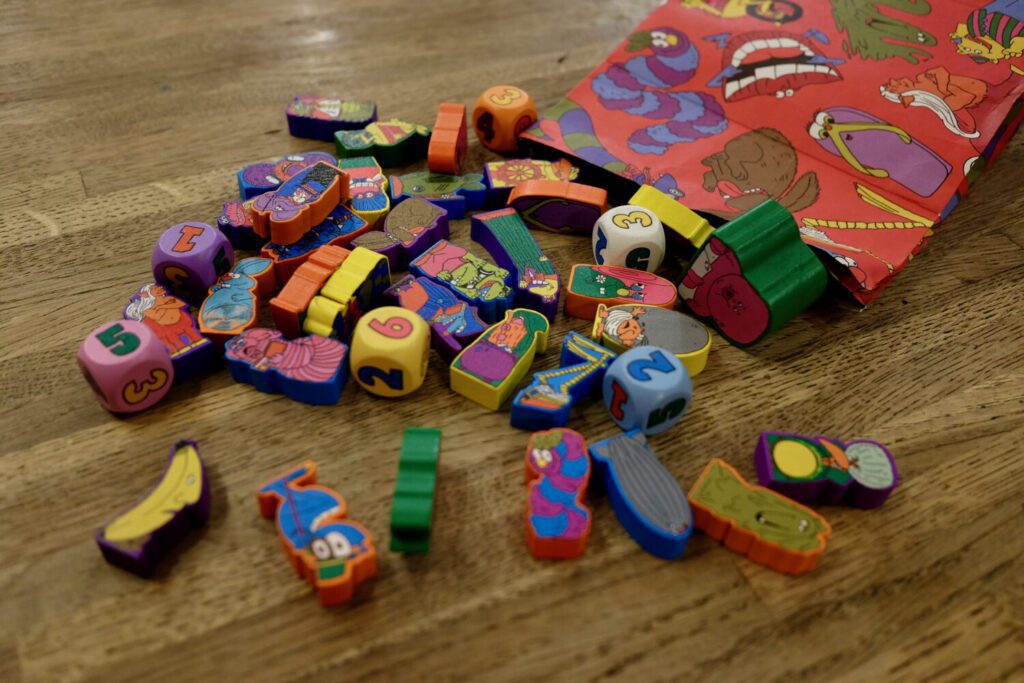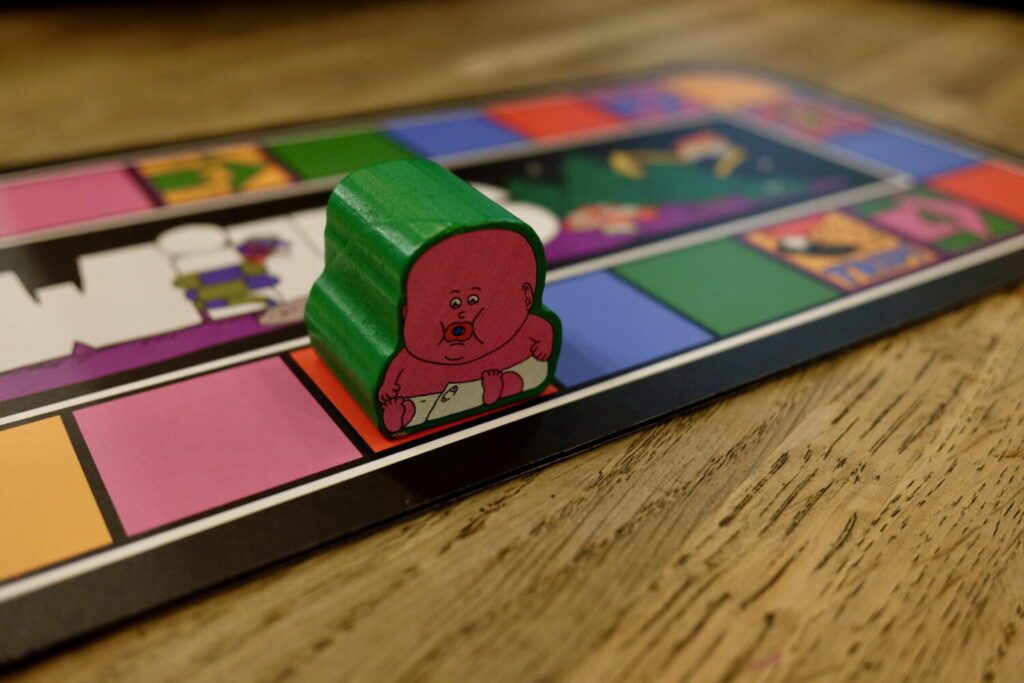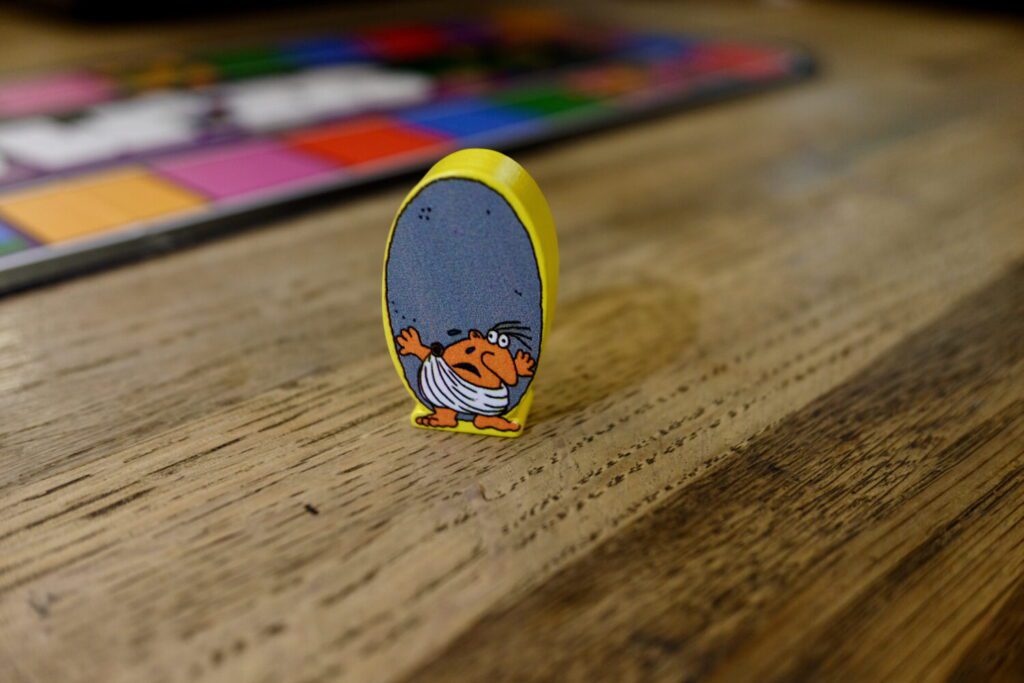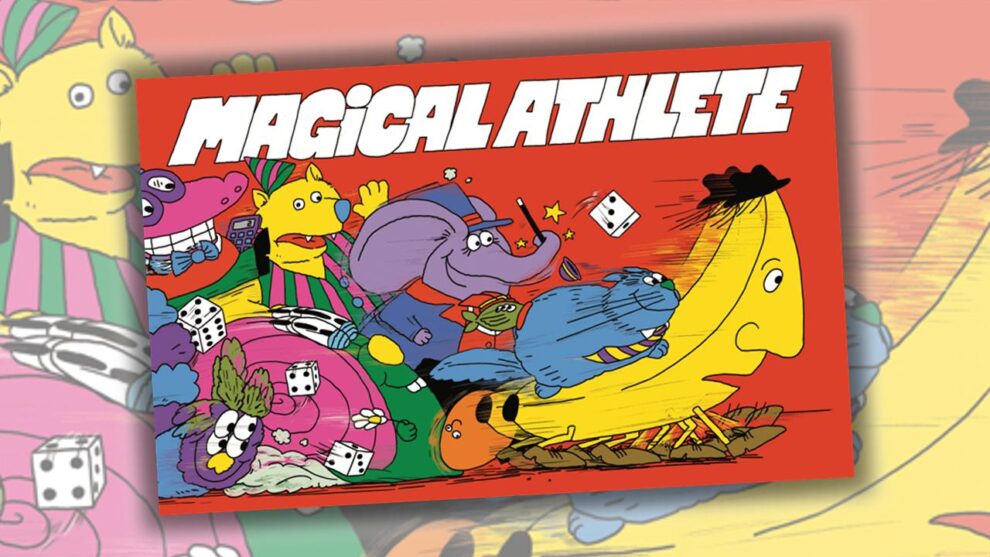Disclosure: Meeple Mountain received a free copy of this product in exchange for an honest, unbiased review. This review is not intended to be an endorsement.
Deciding on a rating for Magical Athlete, a practical concern and SEO necessity when posting on God’s Internet in 2025, puts the lie to the practice of ratings as a whole. There are lofty reasons for dismissing ratings, of course. They flatten art into a binary between “good and bad,” they provide the reader with a simple conclusion without requiring their engagement in nuance and details, yes, yes. I’m not talking about all that.
Rating Magical Athlete is impossible because nearly every single rating could be legitimately and fairly argued.
1/5
Magical Athlete is a roll & move, a type of game that went out of style some time in the 1950s. Think Snakes & Ladders or, if ophidiophobia is an issue, Chutes & Ladders. Think Monopoly without all the fun. Roll a die, move your piece, first one to the end wins. This sort of thing may have passed for a laugh riot prior to the invention of electrical wiring, but it doesn’t cut the mustard now.
Sure, original designer Takashi Ishida and aide-de-campe Richard Garfield (whoever that is) have gussied up the proceedings with bonkers character powers, but all they’ve really done is introduce busy work around the complete lack of decisions. I move, which makes you move, which makes her fall down, which makes them move, which makes me move, which starts the whole sequence over again. If you’re going to make me roll a die and move an admittedly charming wooden character token without making any choices, at least let me do so in peace.
I mean, look. In 2025, there’s a character here called M.O.U.T.H. who engages in flat-out player elimination. If he lands on the same space as another racer, they get eaten. That happened to me on the first turn of a race, so I got to sit there for ten minutes and do nothing. Terrific.
When you think about it, there’s something almost insulting about rendering a race—the most fundamental display of athletic prowess and excellence, an event where skill and conditioning are the only means of assuring victory—through a mechanic that entirely deprives players of any ability. It’s fun for kids, maybe, but they enjoy Paw Patrol. That doesn’t mean much. Why are we here? Why not program the match into an app, press play, and read the results when it’s over?
And not only do you have to engage in this nonsense once, you have to do it four times. Characters are drafted at the beginning of the game, four to a player. At the beginning of each race, all players simultaneously reveal the character they’re entering into that race. If characters were chosen in sequence, that might be interesting, but it’s all up to chance. If you play games to make decisions, Magical Athlete presents little if any opportunity for those. You roll a die, you do what it says, and you count down the minutes until you can put the lid back on the box.

2/5
Magical Athlete proves both the value and the limitations of great presentation. Pouring out 35 colorful, uniquely-shaped wooden figures onto the table is great, a ritual that invokes the very spirit of play. Whoever it was at CMYK who decided to pack the figures in a sturdy paper bag deserves a raise. The crinkling of the paper adds a certain je ne sais lunchbag to the experience. It feels like recess. The board and the cards, decorated with wonderful art straight out of Schoolhouse Rock!, promise silliness. The manual itself is a masterclass in how even the typically lawyerly conveyance of the rules can be adjusted to set the tone.
Suffice it to say that everything about the presentation points your expectations in the right direction, towards silliness and a distinct lack of stakes. But then your expectations run smack into a wall. Dress a roll & move up however you want, it’s still a roll & move. Make it as zany as you can, you’re still putting players on autopilot for thirty or forty minutes, and that’s not fun. What is the point of play if the results mean nothing? Winning means nothing, losing means nothing, and the experience in between, entirely at the mercy of whatever combination of powers are involved in any given race, is uneven.
I’m as glad as anyone that the ludological Blue Period that occupied much of the Euro-heavy 2010s has passed, that we’re no longer fervently clinging to the need for perfect information and determinative outcomes, but I do like the things I do during a game to mean something. For all the love and care that went into the presentation of this new edition of Magical Athlete, I find it hard to work up much enthusiasm for the most important part, the game itself.

3/5
Sure, I love an experiment.
Original designer Takashi Ishida was inspired to create Magical Athlete by Cosmic Encounter. The influence is both easy to see and runs deeper than you might initially expect. Both games start with a straightforward set of central rules—in the case of Magical Athlete, those central rules are “Roll the die and move your character”—and graft on contextually absurd player powers to make the experience enjoyable. Winning and losing aren’t the point. These are process games, games in which the experience of playing is the entire reason for coming to the table.
In an ideal session of Magical Athlete, one die roll can set off a cascade of events. People get tripped by the Banana, or kicked backwards by the Centaur, or blocked entirely by the Big Baby—would you look at the Big Baby? It’s entirely unpredictable, and that’s the entire point. Some powers are greater than others when considered in the context of competition, but Magical Athlete isn’t a game for people who care about that. It’s zany. It’s a Saturday morning cartoon playing out on your table.
Or at least, that’s the idea. While a quick playtime, approachable rules, and absurd character powers make for promising kindling, Magical Athlete often fails to catch. It shares with its primary inspiration a core weakness: the quality of any given session is always subject to the abilities in play. The 35 characters included in this box—it sounds like there will be many more in the future—can all too easily end up in arrangements that fail to do much of anything interesting. Imagine tuning into an episode of Rocco’s Modern Life and having Rocco earnestly read you the news for half an hour.
You’re also at the whims of your player group. Certain people, no matter how they try, will never be able to enjoy Magical Athlete. For the people who define a game’s worth by the quality of the decisions it offers rather than the ways in which it manipulates the social environment, Magical Athlete will never connect. Personally, I don’t have that problem, but I see where they’re coming from. When it works, Magical Athlete is a sweet and silly joy, a chaotic celebration of games for their own sake. I wish I had more to do while playing, and I wish this celebration were a bit more reliable, but between its presentation and the highs when they happen, I’m always happy to play.

4/5
After a few modestly enjoyable plays of Magical Athlete, I figured out what was missing: children. Boy, once you get some 8+ year olds sitting around the table to play this baby, it sings like Leontyne Price after a saltwater gargle. You would not believe the fun, the laughter, the shouts, the agony and the ecstasy.
It’s a perfect game to play with kids because while everything about it tells everyone, “Hey, none of this matters, just enjoy the ride,” children cannot help but care, and so the game unfailingly lands in this magical space where everyone is invested but nobody’s upset. Sure, winning’s great, but have you tried having something unexpected and funny happen?
While I’ve found that most adults need to tap out after a single full session, children can play this for hours. It is a natural hotbed for their creativity. I have watched them come up with their own racers, I have seen them play games where each individual racer has two different powers. I cannot in good conscience recommend that anyone do that—The edge cases…my god…the edge cases…—but it was kind of awesome in its own horrifying way.
I realized, after some time, that Magical Athlete in its current form is delivering on the promise of Snakes & Ladders, which I’ve always thought of as a boring board game rather than an unsuccessful attempt at comedy. We’re funnier now. This is the end point. If we could find the person or people who created Moksha Patam and bring them to the here and now, I suspect they would point with the light of recognition in their eyes, shouting, “Yes! Yes! This was the idea!”

5/5
This edition of Magical Athlete is what I call “a perfect it,” an object that is entirely and exactly what it wants to be. The changes made from the original edition work. The new powers blend in seamlessly with the old ones. Angela Kirkwood’s art is magnificent, quirky and full of character. It is a joy unto itself, a celebration of what games can be and an interrogation of what we look for from our play.
I know and love many games which do not emphasize competition. Party games, for example, are rarely all that concerned with the outcome. Nobody remembers who won or lost a game of Wavelength or That’s Not a Hat. But I don’t know if I own any other games that so directly challenge the players to let go of that impulse to win. To play Magical Athlete while being concerned with the outcome is a fool’s errand. It is an absurd thing to do.
I structured this review in this way in part because I think I myself, at various points in my gaming life, would have fallen into each of the categories. Five years ago, I would have loathed this exquisite contraption, this manic little device. Now, having become far less concerned with games as an arena for expertise and much more interested in having a good laugh, I want hundreds of characters. I want an absurdly large Magical Athlete Big Box, full of race tracks and wooden bits. 20 years from now, I want to hear a whole school of designers talking about how they got their start designing racers for Magical Athlete.
This is a game for people who get excited about playing as the Duelist, who shouts “DUEL!” any time another player shares his space, then duels them—with dice, of course—for the right to move two spaces. This is a game for people who see the words “In the event of an infinite loop, resolve the loop once and move on” in the rulebook and experience a rush of delirious joy. This is a game for those who revel in the unfair, the absurd, and the inevitable.
Is it for everyone? No. Absolutely not. Not adults, anyway. We take ourselves a little too seriously. If you want a racing game from CMYK that’s for everyone, you want Hot Streak. But Magical Athlete is something special. The announcement of its rerelease was met with great fanfare within the design community, and it’s easy to see why. Nothing else is quite doing what this does, and CMYK have made sure that it is doing what it’s doing as well as it possibly could.











